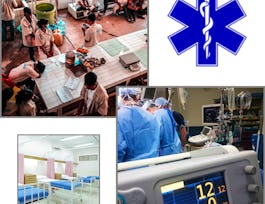Do you dream of being a CMIO or a Senior Director of Clinical Informatics? If you are aiming to rise up in the ranks in your health system or looking to pivot your career in the direction of big data and health IT, this course is made for you. You'll hear from experts at Johns Hopkins about their experiences harnessing the power of big data in healthcare, improving EHR adoption, and separating out the hope vs hype when it comes to digital medicine.



Leading Change in Health Informatics
This course is part of Health Informatics Specialization

Instructor: Ashwini S. Davison, M.D.
Sponsored by Mojatu Foundation
14,059 already enrolled
(286 reviews)
Recommended experience
What you'll learn
Describe essential steps in the process of successfully leading change in health IT organizations.
Recognize the importance of multidisciplinary and interprofessional teamwork in health informatics.
Utilize several common project management and strategic planning tools used by health informaticists.
Apply best practices for successful change management in health informatics.
Skills you'll gain
Details to know

Add to your LinkedIn profile
14 assignments
See how employees at top companies are mastering in-demand skills

Build your subject-matter expertise
- Learn new concepts from industry experts
- Gain a foundational understanding of a subject or tool
- Develop job-relevant skills with hands-on projects
- Earn a shareable career certificate


Earn a career certificate
Add this credential to your LinkedIn profile, resume, or CV
Share it on social media and in your performance review

There are 4 modules in this course
This module introduces students to the role of leadership, teamwork, and governance in health informatics. We use various real world examples to help familiarize you with a well known 8-step process for successfully leading change. During the module, students will be oriented to the purpose of organizational readiness assessments. You'll learn about the role of clinical governance in health IT and the role it plays in designing and optimizing clinical decision support systems.
What's included
13 videos7 readings5 assignments1 discussion prompt
Knowing how to manage projects effectively is an essential skill for health informaticians. In this module, students will be introduced to the standard terminology in project management. We’ll start by defining what a project is and explaining the phases of a project life cycle in the context of health IT. You'll become familiar with the role of a work breakdown structure, Gantt Charts, and process maps. You'll see examples of common project related pitfalls such as groupthink and scope creep. Throughout the course, we incorporate case studies from real health informaticians in the field, both clinical and non-clinical, to illustrate the importance of each of these concepts.
What's included
8 videos2 readings3 assignments1 peer review
This modules introduces students to the importance of strategic planning when leading healthcare transformation efforts. Case studies on the role of strategic planning in mHealth, hospital acquisitions and various telemedicine initiatives are woven in throughout the course with interviews of subject matter experts from across Johns Hopkins. Students will learn about commonly used strategic planning tools such as: SWOT and Scenario Planning. We’ll also review the considerations that go into an organization's decision to Build or Buy and students will be oriented to commonly used terms in procurement such as RFIs, RFPs, TCO, and ROI. During the course, you'll be introduced to the basics of vendor evaluation and will have gain experience in using a vendor evaluation matrix for purposes of decision making.
What's included
10 videos4 readings3 assignments1 peer review
In this module we’ll cover the complexities of change management in health information systems. Students will be introduced to the PDSA (Plan Do Study Act) cycle. We'll demonstrate the value of taking into account the current clinical workflow and how any intervention will impact it. Challenges associated with usability and workarounds with health information systems are explored. Students will have an opportunity to review and critically interpret a go-live-readiness assessment. This module covers best practices in change management and the need for proper documentation and effective communication of changes.
What's included
13 videos7 readings3 assignments1 discussion prompt
Instructor

Offered by
Why people choose Coursera for their career




Learner reviews
286 reviews
- 5 stars
78.74%
- 4 stars
16.02%
- 3 stars
2.43%
- 2 stars
1.04%
- 1 star
1.74%
Showing 3 of 286
Reviewed on May 15, 2019
Excellent course! I highly recommend for anybody interested in health informatics
Reviewed on Dec 29, 2019
It's is nice course and gave an good idea over changes and management
Reviewed on Dec 4, 2021
The course focuses on important part of Health IT, which is change management and how can we work on preparing the medical staff to work in harmoney with the IT team.
Recommended if you're interested in Health

Rutgers the State University of New Jersey

University of California, Davis

Northeastern University

University of Minnesota

Open new doors with Coursera Plus
Unlimited access to 10,000+ world-class courses, hands-on projects, and job-ready certificate programs - all included in your subscription
Advance your career with an online degree
Earn a degree from world-class universities - 100% online
Join over 3,400 global companies that choose Coursera for Business
Upskill your employees to excel in the digital economy


